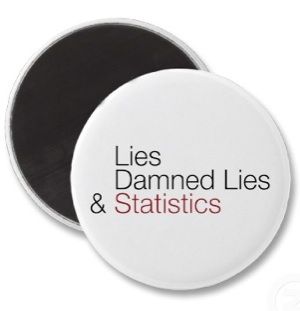
I doubt that much can me learned from the Khan et al. (2013) study on the association between political conservatism and preference for familiar brand name products (see here). With the unit of analysis being the county, inferences about individual psychology are highly uncertain, to put it mildly. Khan et al. know this but brush the matter aside.
Here, I describe a statistical asymmetry that undermines their argument. Supposing that [a] political conservatism indeed causes individual people to prefer familiar brands over generic or novel ones, and if [b] there is variation in the proportion of conservatives over counties (trivially true), then [c] there will be a correlation between the proportion of conservatives and the proportion of brand lovers over counties. The reverse is not true. If there is a correlation between the proportion of conservatives and the proportion of brand lovers over counties, there remains a wide window of possible correlations within counties, which gives Khan et al. a reverse inference problem. They confuse highly uncertain inferences from aggregated to individual data with far less uncertain inferences from individual data to aggregated data. Because all their theoretical claims and pretensions are about individual-level phenomena, the data of their study are practically worthless.
Here are some numbers that anyone can work out in a spreadsheet. Suppose in County 1 the probability of being Republican is .6 and the probability of buying a brand given that one is a Republican is .99, whereas the probability of buying a brand is .7 if one is not a Republican. By multiplying these conditional probabilities with the base rate probabilities of being a Republican (vs. not), we obtain the compound probabilities of being a Republican and buying a brand (.59), being a Republican and not buying a brand (.01), not being a Republican and buying a brand (.28) and not being a Republican and not buying brand (.12). The correlation phi between political affiliation and brand preference is .43, just about as high as you can make it with the highly skewed base rate probability for buying a brand (.87).
Keeping the conditional probabilities of brand buying given Republicanism (vs. not) the same, and dropping the probability of being a Republican to .4, the marginal probability of buying a brand drops to .82 (and phi within this county drops slightly to .37). Over counties, we now have a positive correlation between the probability of being a Republican (.6 vs. .4) and the probability of buying a brand (.87 vs. .82). This correlation has emerged because within each county, a Republican orientation predicts (perhaps causes) brand loyalty. Assuming that there are as many counties with a .6 rate of Republicans as counties with a .4 rate, and with the conditional probabilities of brand buying being .87 and .82 respectively in high- and low-Republican counties, the correlation between type of county and the probability of brand buying is .07. It’s not much, but it is there. This result was obtained from the correlations between political affiliation and brand buying within counties.
When trying the reverse, we find that in the largely Republican county (p = .6), a marginal probability of brand buying of .87 allows a correlation over individuals as negative as -.32. In the county with a minority of Republicans (p = .4), with a marginal probability of brand buying of .82, the correlation may drop to -.57. So no, a correlation over aggregated units (counties) does not entail correlations of the same direction over disaggregated units (people).
Khan and her team want to argue that political conservatism is bound up with personality traits (e.g., dogmatism, intolerance for ambiguity, risk aversion) that cause individuals to make purchasing decisions that feel psychologically safe. Their data are correlational, and the correlations are at the wrong level of abstraction. To propagate a causal claim nonetheless is rather undogmatic, risk-seeking, and accepting of ambiguity; too much so in my book. When liberalism comes across as wishful thinking, its reputation suffers.
Causal Model
Khan and colleagues are careful not to commit themselves to a causal interpretation of their data, in respect of the correlational nature of these data. There is, however, suggestion and the play on the reader’s imagination. Why would the authors give so much room to the negative personality correlates of political conservatism? Why mention them at all? Rules of conversation dictate that what is mentioned matters. The personality traits of dogmatism, risk aversion, etc. – let’s call them collectively P – might participate in a causal model as common background causes or as mediators.
If P is a common background cause, it affects both political orientation and brand-driven consumption. If so, the correlation between conservatism and brand consumption is spurious. To get into the causal game, the study would have to include personality measures. The trouble with the common cause model is that one would have to assume that P shows variation over regions of the country that mimics (actually causes) the variation seen in political orientation that many believe is well understood in sociological terms.
If P is a mediator, it causes brand-driven consumption directly. This is interesting and should be studied directly. Also, P would be caused by political conservatism. In other words, conservative convictions would have to turn a person into a dogmatic and fearful character. Perhaps, but that would be a bold claim because usually traits are assumed to be more deeply rooted than attitudes, and hence more likely be their causes than their effects.
Finally, there could be a direct causal effect of conservatism on consumption. If so, P would need not and should not be mentioned at all. To pathologize people’s properties and habits is to use a sharp knife. It should not be wielded lightly. That would not be, for lack of a better term, the liberal thing to do.
Khan, R., Misra, K., & Singh, V. (2013). Ideology and brand consumption. Psychological Science, published online 4 February. doi: 10.1177/0956797612457379




